Creating Sustainable Solutions: Students Learn from Environmental Activists Fighting for Justice in Newark’s Ironbound
Posted in: Anthropology, CHSS News, Homepage News and Events
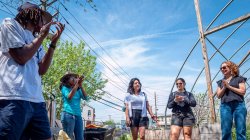
Krishna Polius, a PhD student in Environmental Science and Management, knows what it means to fight for a cleaner community. A geochemist by training, her experiences include testing drinking water during the crisis in Flint, Michigan, and serving in the AmeriCorps to raise awareness about water quality issues in New Jersey.
Still, she was surprised by what she saw in Newark’s Ironbound and the proximity of polluters to children playing in the streets. “It was startling to me because of the health risks,” she says.
The industrial neighborhood – a concentration of factories and warehouses, a power plant, chemical refineries, the state’s largest garbage incinerator and a Superfund site – has long been the focus of protests and activists dedicated to uplifting this overburdened community of color, continuing a fight for clean air and land.
“The stories we heard of the activism – what’s been, what’s in the works, what’s going on – that aspect gave us hope,” adds Leanna Sanchez ’22, who joined Polius and other students in a Montclair State University Anthropology class for a tour around the Ironbound.
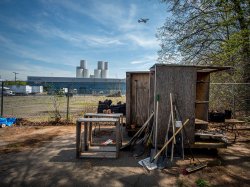
Despite all odds, change has happened. Led by the Ironbound Community Corporation, environmental justice and social service programs, including early childhood and after-school enrichment, empower the low-income community – with its garden, Down Bottom Farms, proof that transformative change is possible.
“Seeing the garden was definitely a manifestation of the work absolutely being done,” says Sanchez, a December graduate with a degree in Anthropology now working toward a master’s degree in Sustainability Science.
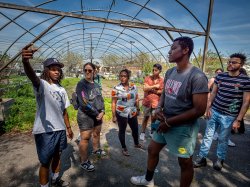
“Change doesn’t happen overnight, but it can happen,” says Anthropology Professor Katherine McCaffrey. She teaches “Building Sustainable Communities,” a class that explores local and regional strategies being used to improve communities disrupted by climate change. She also draws on the strength of University partnerships, inviting leaders in the sustainability movement to class and collaborating with the University’s PSEG Institute for Sustainability Studies on special projects.
“We are always talking in class about how to identify the vulnerable,” says Gianna D’Aloia ’21. “What can we do for them? How can we bring them together so they’re involved in decisions that are being made, that impact them.”
This semester, the three graduate students, D’Aloia, Sanchez and Polius, are collaborating with the Township of Verona, identifying with mapping software heat islands and designing ways to lessen the higher temperatures found in various parts of the town. The work is being done in partnership with Verona’s Green Team and Sustainable New Jersey, with findings to be presented to the township’s Planning Board this spring.
“We’ll be making suggestions for green infrastructure, plantings, rain gardens and bio soils and different kinds of infrastructure that will help reduce heat and manage stormwater,” Sanchez says. “We’re trying to bring ideas that are going to mesh with the community, are inexpensive and aesthetically pleasing.”
The students are also coming to terms that such work proceeds more slowly than hoped. “They’re learning that sometimes in order to be effective, you need a different pace. It’s not a matter of checking boxes and meeting deadlines. You need to take the time to talk and meet with people,” McCaffrey says.

For many of the Montclair students, the Ironbound tour was an eye opener. “If you care about your kids or your grandkids, then you have to care about the resources in terms of social, environmental, political and economic matters. You have to educate yourself and find something you care about,” says D’Aloia, who graduated with a degree in Philosophy and will earn her master’s in Sustainability Science this May.
“Start talking about it, start making people worried about it,” she says.
Photo Gallery
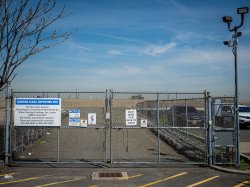
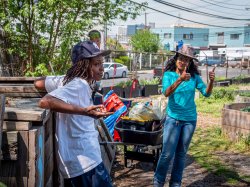
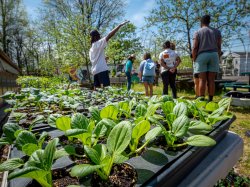
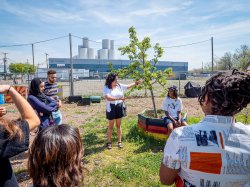
Story by Staff Writer Marilyn Joyce Lehren. Photos by University Photographer Mike Peters and John J. LaRosa.
You May Also Like:
